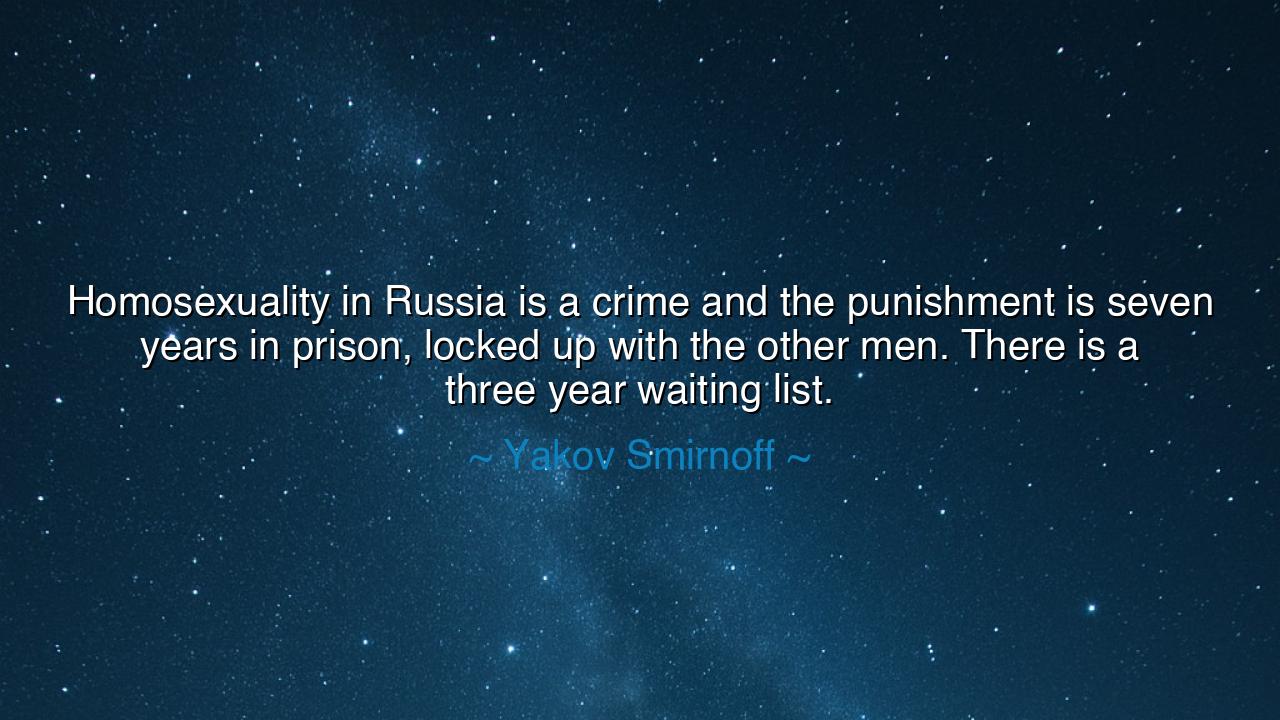
Homosexuality in Russia is a crime and the punishment is seven
Homosexuality in Russia is a crime and the punishment is seven years in prison, locked up with the other men. There is a three year waiting list.






Hear the words of Yakov Smirnoff, comedian of exile and observer of empires, who declared with cutting irony: “Homosexuality in Russia is a crime and the punishment is seven years in prison, locked up with the other men. There is a three year waiting list.” At first, it seems no more than a jest, a clever turn of laughter. Yet beneath its humor lies the heavy shadow of oppression and the absurdity of injustice. For through wit, Smirnoff exposed the contradictions of a society where love itself was condemned, and punishment became a parody of the crime.
In the Soviet Union, where Smirnoff was born, homosexuality was not only forbidden but criminalized, punishable by long years of hard labor. The state, which claimed to be the engineer of a perfect society, wielded its laws as chains to crush difference, to enforce uniformity of thought and behavior. Yet humor has always been the weapon of the oppressed. By cloaking truth in laughter, Smirnoff made visible the cruelty and absurdity of these laws. For what greater irony than to punish love between men by confining them with men? His words pierce like an arrow, showing that tyranny often collapses into contradiction.
History is rich with examples of how satire has unmasked power. In the courts of kings, jesters spoke truths that others dared not. In Nazi Germany, whispered jokes mocked the grandiose pretensions of the Reich, sustaining hope in secret hearts. Under the Soviet regime, political humor became a quiet rebellion, a way for the common people to resist despair. Smirnoff’s joke belongs to this noble tradition: the laughter that frees the soul when the body is bound, the jest that unmasks the lie of authority.
But the quote also reveals something deeper about the human condition. Laws may condemn, but they cannot erase desire, identity, or truth. By making love a crime, societies reveal not their strength but their fear—the fear of difference, the fear of what they cannot control. And when punishment mirrors the very thing it condemns, as in Smirnoff’s jest, it shows that injustice is often absurd at its core. The humor, then, is not only entertainment—it is revelation.
Consider also the story of Oscar Wilde, who in nineteenth-century England was imprisoned for “gross indecency.” His punishment destroyed his health and reputation, yet it also revealed the hypocrisy of a society that celebrated art, beauty, and wit, while crushing the man who embodied them. Wilde’s tragedy, like Smirnoff’s comedy, shows that laws born of prejudice are always doomed to contradiction. For what is natural cannot be erased, only driven underground until truth rises again.
The lesson here is not merely to laugh, though laughter is a weapon. It is to recognize injustice cloaked in law, and to resist it with courage, clarity, and sometimes with satire. When we hear words or decrees that condemn love, that criminalize identity, we must not remain silent. We must laugh at their absurdity, yes, but also rise against their cruelty. For a society that imprisons people for who they are imprisons itself, binding its spirit in chains as surely as it binds bodies behind bars.
Therefore, O seekers of justice, let Smirnoff’s jest awaken you: tyranny is often absurd, but it is no less cruel. Laugh at its contradictions, but do not dismiss its dangers. Use wit as a blade, and courage as your shield. Stand for love where others condemn it, defend freedom where others fear it, and expose hypocrisy where others hide it. For in laughter and truth combined lies the power to unmake the walls of oppression and to open the world to freedom’s light.






AAdministratorAdministrator
Welcome, honored guests. Please leave a comment, we will respond soon